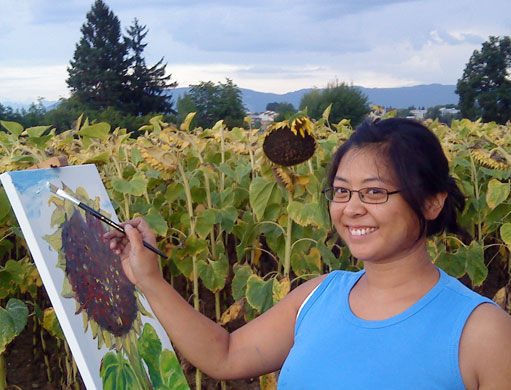
ATLAS e-News
23 February 2011
15 November 2010
Regina Kwee
Nationality: German

Year 2000, which was declared as the “year of physics” in Germany, was the very year, when Regina Kwee finished high school with the German Abitur in Berlin. She and a friend visited the particle physics exhibition “Trip to the Big Bang” and this may well have triggered her interest for this field. She was very much interested in physics, although she had an humanistic education with focus on ancient Greek and Latin. “But for both [fields] one needs an analytical approach”, Regina emphasizes. Unfortunately her last physics teacher had not succeeded in sparking her interest: ”He never explained things properly, books were much more trustworthy. He was even surprised we knew about neutrinos!” So for this reason Regina was happy to finally meet physicists who did answer all her questions. ”Christoph Rembser was among these physicists whom we pestered with questions”, she remembers ”and now I am at CERN and we both work for the same experiment!”
Despite that positive experience with ”real physicists”, Regina fell unprepared to study physics but also wanted to do something applied and useful. So she first did an 11-week training at Daimler-Chrysler Werke in Mannheim, where she enjoyed screwing engines together and learned about fuel cells and alternative engines. She started her studies at the Applied University (FH) in Berlin in Electrotechnique and Energy Systems. “My goal was to work on regenerative energies, I wanted to learn about new, environmental friendly technologies and make them used, but I realised the FH was not the right place for that. Often one had to leave the real answers to mathematicians or physicists.” During the semester break, she did more practical training for the FH in the electronic group of DESY Zeuthen. “It was great there, I also met many enthusiastic physicists”, Regina recalls.
After this two week training, Regina decided to go into physics and signed up at the Humboldt University in Berlin. “We were a just a small group of around 40 physics students. Our professor Lutz Schimansky-Geier supported us very much - in his way, giving us a lot of extra exercises and lessons” she smiles, so “After the Vordiplom, only 10 students were left, me among them – and we stayed until the final exam.”
“What fascinates me in physics is to get to the limits of imagination. During my studies I learnt that so many abstract, mathematical concepts are actually applied in nature.” In 2005 she spent two semesters in Lausanne studying physics at the EPFL “to get another point of view on physics” – but also to learn another language that is actually still spoken.
She returned to Berlin in 2006 to finish her studies and joined the DESY group that had just become part of ATLAS. “In the beginning, we were just two diploma students and the seniors. But this turned out to be actually good: my supervisor, Klaus Mönig, knew the group had only little experience on the ATLAS software. So whenever we needed to talk with the experts, we were sent to them. This way, I had the chance to travel to the U.K. and several times to CERN. This boosted my work a lot.” Regina finished her diploma thesis on the “Development of Inner Detector Minimum Bias Triggers in ATLAS” a year later in autumn 2007.
Since January 2008, she has been a CERN doctoral student with the Gentner-Programme. In her thesis, she started by continuing on minimum bias triggers and finishing the implementation of the trigger. "I worked with so many highly professional people. I really appreciate this atmosphere.”
She plans to complete her PhD by the end of the year and is currently writing up her thesis.
In her spare time, she learned snowboarding “I had to when I was in Lausanne, but it was fun with the EPFL guys, even though I was more sitting in the snow than standing on the board in the beginning”.
Regina has an artistic side as well, so in the Summer, one can spot her in the fields of Meyrin with her easel, palette and brushes. ”I had art in high-school and some of my art teachers were very committed. They organized excursions and exhibitions where we showed our paintings. I even sold some paintings!” she grins. “With a friend I knew from EPFL, we transformed an attic into a studio. Unfortunately we use it much too seldom.”
What are her plans after her PhD? “I joined ATLAS in its start-up phase, now I am ready to do more data analysis!” So a postdoc would be a nice option. “But I am also open to other, more applied fields - as long as it fascinates me” she smiles. Regina has not yet made up her mind between research or going into industry – just keeping her options open.

Birgit EwertATLAS e-News
|